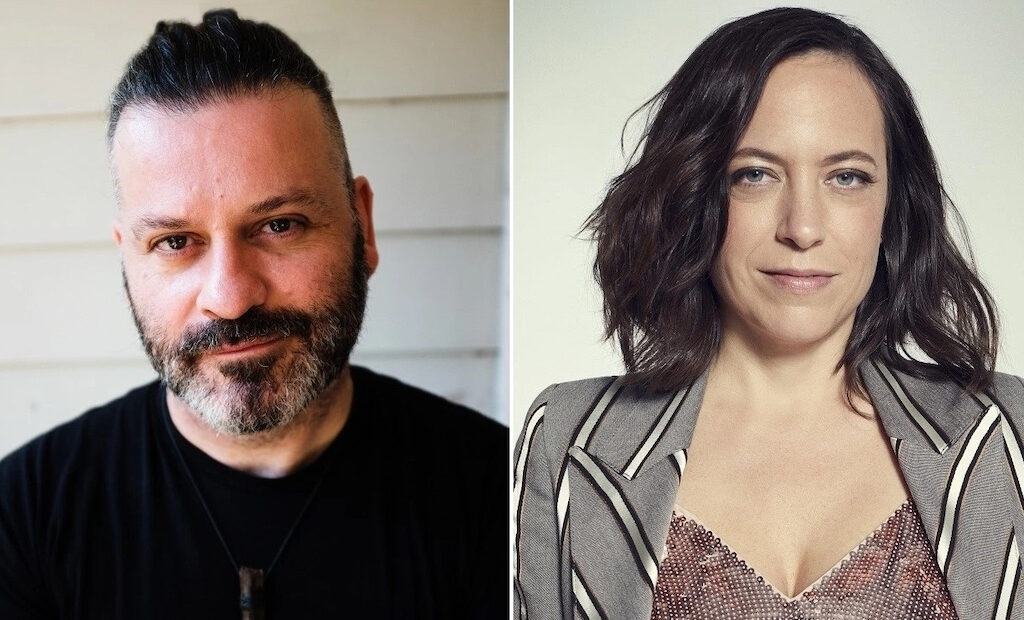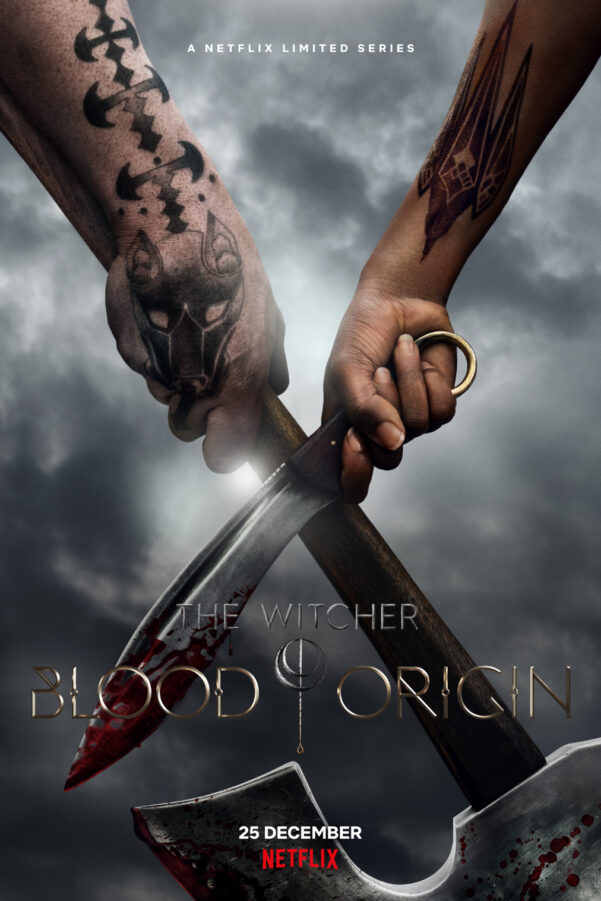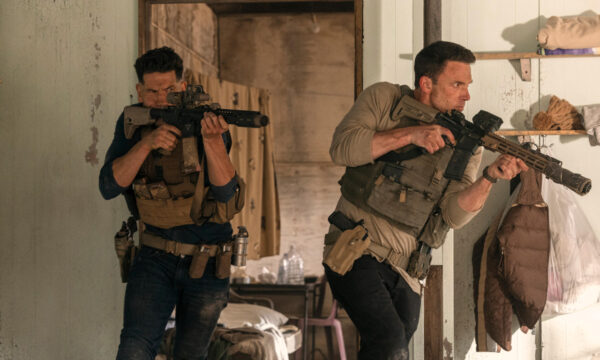“Turns out Michelle Yeoh is the biggest joker in the world”: Declan de Barra and Lauren Schmidt Hissrich on The Witcher: Blood Origin

The Witcher: Blood Origin is a new four-part spin-off series that delivers a backstory to the ancient civilisation. Set over a thousand years ago before the events of The Witcher, seven Elven outcasts set out on a quest to overthrow a powerful empire. Their story brings to the screen the creation of the first-ever prototype Witcher and unfolds the events leading up to the Conjuncture of the Spheres.
The Upcoming had the pleasure of hearing from producers Declan de Barra and Lauren Schmidt Hissrich as they told us about bringing history to this franchise, the casting process and what fans can expect from this setting of another chapter.
How did you balance this new spin-off against the franchise?
Declan de Barra: It had to feel fresh and set up the world of The Witcher in the books and the TV show. It set up characters like Avallac’h and Eredin, but it needed to be something new. It had to be self-contained as a story so those that didn’t know The Witcher world would understand this as a story, but it also had to honour the books. We have this great thing set up by Andrzej Sapkowski, which is the Elves. When we meet them in The Witcher they’re beaten and downtrodden, barely surviving, so we got to play the flip of that: what was the world like before the Conjuncture of the Spheres, before they were colonised? What great heights did they reach? In a way, their world was more scientific and magically advanced than the world in The Witcher. That was the balance – respecting the books, setting up the stories, but also exploring fresh snow.
Lauren Schmidt Hissrich: What was fun for both of us was to discover something in season three and I would write to Declan: “Is there a way to weave this in?”, and vice versa. There’s so much great stuff in Blood Origin that the writer of the main show gets to take and run with. Book of Monoliths is one, obviously. Monoliths are very important to our show, and, obviously, the characters that Declan mentioned. It’s a storyteller’s dream because we constantly got to pass the baton back and forth.
DDB: Cross-pollination dream!
The world of The Witcher has limitless possibilities. Do you think we could see some characters from Blood Origin in the main series in the future, especially with time travel being explored in the series?
DDB: Time travel was the fun part of this – especially at the end. It’s absolutely a possibility but it’s in the hands of Lauren.
LSH: I love that Declan planted these characters, Avallac’h and Eredin. We get to see them before; they’re not even the same people when we see them in The Witcher because they’ve got 1,200 years of experience and they are hardened somewhat by what they’ve seen. The writers’ room for The Witcher has also fallen in love with these characters, and definitely ones where we think, “How do we bring this person back?”.
DDB: If you’re not dead on Blood Origin, you can be alive anywhere else.
How do you adjust to people watching this on iPhones or tablets? How can you make sure they have the full experience?
DDB: I started as a musician and I know that people have these fancy speakers and I’m like, “Let me hear it on the worst speaker and on the worst pair of headphones”. It needs to work on that level; it needs to work on an iPhone. We’re very lucky to now have these big TVs, but most of the world is watching on an iPhone on a train or wherever, so you’ve got to absolutely take that into account. When we were doing post, we watched it knowing it was going to be watched on an iPad or iPhone, and it doesn’t frustrate me at all. As long as you can see the characters and feel for them, hopefully it’ll reach the same, whether on an iPhone or a TV. You should disappear into the world and fall in love with the characters – even if you just listen to it, you should be able to follow it. In some way watching it on a smaller device allows you to fill in different details, more like when you hear a story around the campfire or a folk tale when you’re growing up: you paint all of these different images.
The series airs on Christmas Day. With all the blood, gore and action, do you think it lends itself to festive viewing?
DDB: It depends on your family situation because this could be perfectly descriptive of some families’ Christmases, with blood, gore, violence and alcohol! It’s the perfect time to binge, and this is a very binge-able show. We deliberately made it a good, sharp, short bang in the face. You’ve had your wine, your turkey, all the arguments are done – ready to sit down and watch the show and be transported to another world. Perfect.
The characters seem like they’re at the end of their journey – a lot of their stories are told, rather than seen. Will there be any expansion on them if there’s love for the series?
LSH: One of the things we asked Declan to do was write a closed-ended series so we knew it could have a beginning, middle and end, that new people could come to it, watch it, fall in love, and they didn’t need to have any knowledge of The Witcher world. Declan’s a smart writer and left the characters in places where you want to know what happens next. I mean, Eile is pregnant at the end and, as a fan and a viewer, I want to know what happens next.
DDB: I wanted, as well, to finish on that unresolved core, where we don’t know what happens to some of these characters. We kind of fall in love with them a little. I love the idea of someone going, “I’m going to write Meldof fan fiction”, or maybe “Merwyn survives and I’m going to write about her”. I love that idea.
Which of the characters surprised you most and was furthest away from what you originally wrote?
DDB: I held out in casting to find the person who most sounded like the voice in my head – the ones that matched what was on the page. Sometimes it was a long wait and it might be a fresh actor who you haven’t come across before, but, in terms of surprising me, I guess Michelle Yeoh, as I had pictured her as very aloof. I was a huge fan, so I was slightly nervous when she came on stage and, turns out, she’s the biggest joker in the world, constantly pranking, running up and high-kicking and joking, and it was a great surprise.
How did you go about the casting process for this spin-off and did you have some of them in mind already?
DDB: Some of the characters develop as you’re going along and some are late additions; some you have in your head from the very beginning like Michelle, for example. What was really nice about this process was discovering people like Sophia and her voice. I wrote the songs for this and I was thinking, “I hope the actor will be good at this and bring something to it” – because, yes, you can be a good actor, but for songs and how you inject something into it… it was crucial for this show and she was brilliant.
Declan do you think, writing this, you were influenced by Irish folklore or mythology in any way?
DDB: 100%. Anyone that grows up in Ireland has these stories, like Cú Chulainn, and you’re already primed for genre and fantasy. Then you read fantasy novels and they’re great but they’re almost not a patch on the stories we had growing up. I wasn’t doing something fresh – Andrzej Sapkowski dips heavily into Irish mythology, as well as European too. It’s in some of the names he uses and I use too, like Scian and Balor. I wouldn’t be a writer or musician at all if it wasn’t for those stories.
Although this is set 1,200 years before The Witcher, we see Jaskier (Joey Batey), a fan favourite, return for this series with that very direct tie-in where he talks to Minnie Driver’s character. What was the logic behind the decision to bring him into this?
LSH: The series wasn’t initially conceived with this framing device. I think we were against it for a while, and yet, what we hope and want is that Blood Origin appeals not only to Witcher fans but to new audiences too. If you’re coming in as a new viewer you kind of need to know where you’re landing. What is this all about? So that was something this framing device allowed us to have. Jaskier is the perfect framing device: yes, he’s a fan favourite, but what Declan and the other writers really wove was the way a story is told, the way it’s passed on. We’d already seen Jaskier do toss-coin in The Witcher, which is all about changing history, getting people on Geralt’s side and away from the concept of the butcher. So this was the perfect way to open and close the show, because you have Minnie Driver’s character saying, “This is a story that needs to be told”, and then using Jaskier works well into our season three as well and how that story has impacted him.
DDB: It was a no-brainer – you get there and think, “Why didn’t we do this on the very first day?”. Joey is wonderful too; he was out there in the cold and the rain, covered in blood… everything’s on fire. He never complained once. He was brilliant.
Alongside the main Witcher series, Blood Origin is incredibly diverse in terms of race and sexuality. Can you talk about that choice?
DDB: I know it’s an Elven world, I know it’s fantasy, but everybody’s got to relate to it. Our world is a diverse world, so why would we not show the same things in this world? Life is sometimes shite and this gives people a world to go into and find characters and power in there that they might not have in their lives at that moment.
There are a lot of independent, strong women in your series. How important was it for you to step away from that age-old trope of the damsel in distress?
DDB: Fortunately modern literature and fantasy have drifted away from that. For fantasy to work, it has to be a grounded world you believe in. Even though it’s fantastical. So, if half of your world is badly written and doesn’t have a purpose and is just reactive and doesn’t have wants or needs, then you’re not going to be able to relate to it.
If everyone was in jeans and tops would it have the same impact? Can you talk about the modern setting but with a fantasy world?
DDB: Good point. It’s fantasy – it has to have a unique point to it, otherwise, you’re just watching a drama in a modern world. It’s like good sci-fi: a good William Gibson book transports you, it’s close enough that you can relate but it’s also something new and fresh. Yes. this has classical structures in terms of royal court dramas, revenge stories and putting together a good team to do Samurai etc, but you bake that world so it’s a special unique place that doesn’t exist anywhere else. That’s why this show isn’t like Lord of the Rings or House of the Dragon. It’s its own thing – it’s the punk rock version of all of that.
LSH: One of the things we get to do is challenge some of the stereotypical fantasy tropes. One thing is the clothing. It’s not the same as on The Witcher or Lord of the Rings. Fantasy doesn’t have to be one thing anymore, and that’s part of the beauty of this.
DDB: Some people get upset and say, “Oh these Elves don’t look like the ones from classic fantasy”. That’s ok – classical fantasy still exists, we aren’t taking it away from that; one version isn’t better than another, it’s all complementary to each other, and there’s room for all of it.
Ezelle Alblas
The Witcher: Blood Origin is released on Netflix on 25th December 2022. Read our review here.
Watch the trailer for The Witcher: Blood Origin here:

























Facebook
Twitter
Instagram
YouTube
RSS